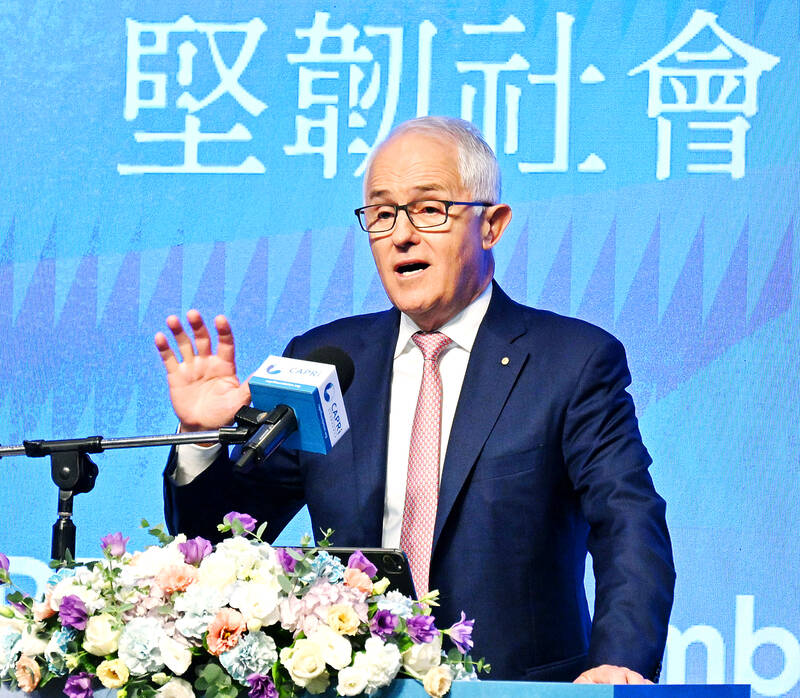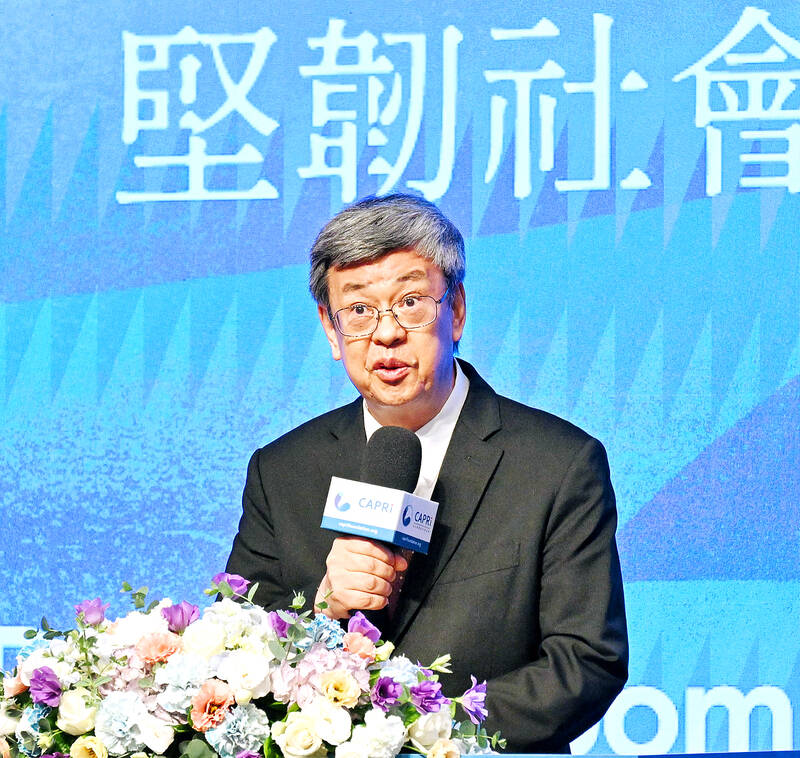The viewpoint of Taiwan is more important than ever for Asia-
Pacific democracies when facing current challenges, former Australian prime minister Malcolm Turnbull said in Taipei yesterday.
Turnbull made the remark in his keynote speech titled “Democratic Leadership in a Populist Age” at an annual forum hosted by the Center for Asia-Pacific Resilience and Innovation (CAPRI) think tank.

Photo: Fang Pin-chao, Taipei Times
The challenges posed by authoritarian governments are becoming more serious, but Russia’s invasion of Ukraine has made NATO stronger and the Western world more united in defending democracy, he said.
Ukrainians’ tenacious and courageous fight against Russia demonstrated that “democracies must support each other,” Turnbull said.
Democracies in the Asia-Pacific region should “ensure the strong does not do as they will,” and defend democracy and the right of nations to determine their own destinies free from coercion, he said.

Photo: Fang Pin-chao, Taipei Times
Another great threat to democracy is disinformation, spread by external forces and domestic conspiracy theorists, Turnbull said.
He warned against the dominance of social media, which has transformed the media landscape and made society more divided.
A diversity of voices helps reduce the risk of monopolies, but audiences in today’s world often only hear the voice most similar to their own and media are striving to capture their attention by presenting increasingly extreme views, Turnbull said.
To defend democratic resilience in the social media era, people need to “stand up for truth and call out lies for what they are,” which requires input from the government and responsible media organizations, he said.
Trust can be built on the foundation of truth and transparency, he added.
Turnbull, who serves as chair of CAPRI’s International Advisory Council, is making his first visit to Taiwan.
Premier Chen Chien-jen (陳建仁), in his speech at the forum, said that Taiwan demonstrated economic and industrial endurance during the COVID-19 pandemic, and continues to bolster the resilience of its economy, workforce and the environment.
Global challenges, such as the pandemic, climate change and the Russia-Ukraine war, “have made evident just how vulnerable and helpless national economies and global supply chains are in the face of sudden extreme risks,” Chen said.
To combat challenges beyond national borders, “we must all rely on working together with like-minded countries to adopt consistent and effective responses,” he said.
“Be prepared for danger in times of peace” is a motto Taiwanese live by, he added.
Despite being excluded from the UN system, Taiwan “has consistently fulfilled its responsibility as a member of the global village” by promoting the transition to net zero emissions, he said.
“Taiwan is glad to share its experience in post-pandemic national resilience-building with the global community,” and looks forward to working with international partners to promote resilience and prosperity, Chen said.

MAKING WAVES: China’s maritime militia could become a nontraditional threat in war, clogging up shipping lanes to prevent US or Japanese intervention, a report said About 1,900 Chinese ships flying flags of convenience and fishing vessels that participated in China’s military exercises around Taiwan last month and in January have been listed for monitoring, Coast Guard Administration (CGA) Deputy Director-General Hsieh Ching-chin (謝慶欽) said yesterday. Following amendments to the Commercial Port Act (商港法) and the Law of Ships (船舶法) last month, the CGA can designate possible berthing areas or deny ports of call for vessels suspected of loitering around areas where undersea cables can be accessed, Oceans Affairs Council Minister Kuan Bi-ling (管碧玲) said. The list of suspected ships, originally 300, had risen to about 1,900 as

Japan’s strategic alliance with the US would collapse if Tokyo were to turn away from a conflict in Taiwan, Japanese Prime Minister Sanae Takaichi said yesterday, but distanced herself from previous comments that suggested a possible military response in such an event. Takaichi expressed her latest views on a nationally broadcast TV program late on Monday, where an opposition party leader criticized her for igniting tensions with China with the earlier remarks. Ties between Japan and China have sunk to the worst level in years after Takaichi said in November that a hypothetical Chinese attack on Taiwan could bring about a Japanese

MORE RESPONSIBILITY: Draftees would be expected to fight alongside professional soldiers, likely requiring the transformation of some training brigades into combat units The armed forces are to start incorporating new conscripts into combined arms brigades this year to enhance combat readiness, the Executive Yuan’s latest policy report said. The new policy would affect Taiwanese men entering the military for their compulsory service, which was extended to one year under reforms by then-president Tsai Ing-wen (蔡英文) in 2022. The conscripts would be trained to operate machine guns, uncrewed aerial vehicles, anti-tank guided missile launchers and Stinger air defense systems, the report said, adding that the basic training would be lengthened to eight weeks. After basic training, conscripts would be sorted into infantry battalions that would take

DEEP-STRIKE CAPABILITY: The scenario simulated a PLA drill that turned into an assault on Taiwan’s critical infrastructure, with the launchers providing fire support Taiwan yesterday conducted this year’s first military exercises at Longsiang Base in Taichung, demonstrating the newly acquired High Mobility Artillery Rocket System’s (HIMARS) ability to provide fire support and deep-strike capabilities. The scenario simulated an attack on Penghu County, with HIMARS trucks immediately rolling into designated launch areas and firing barrages at the Wangan (望安) and Cimei (七美) islands, simulating the provision of fire support against invading forces. The HIMARS are supposed to “fire and leave,” which would significantly increase personnel and equipment survivability, a military official said. The drill simulated an exercise launched by the Chinese People’s Liberation Army (PLA) Eastern